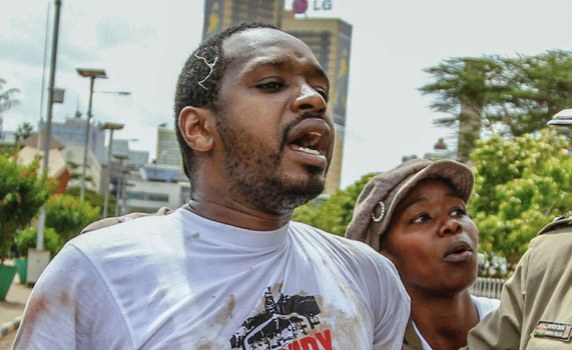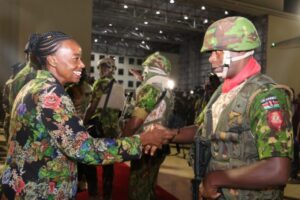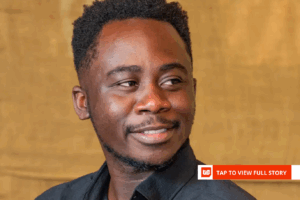
Special Report — Kenya is set to witness an unconventional political campaign after human rights activist Boniface Mwangi launched his bid for the country’s presidency in 2027. The photojournalist turned human rights activist two decades ago is known for painting walls with thought provoking street murals, and leading demonstrations against corruption.
During the launch of his bid in Nairobi his speech fused the defiance of his activism with a vision of a ‘kinder nation,’ pitching himself as the champion of a restless younger generation disillusioned with establishment politics. He framed his run as collective, rather than personal.
“I speak as we, not as I, because I belong to a movement that loves Kenya and has the courage to do the right thing at the right time. And that time is now.” he told a crowd largely consisting of Gen Zs and millenials at Ufungamano house in central Nairobi.
Follow us on WhatsApp | LinkedIn for the latest headlines
Ufungamano house was the launchpad for Kenya’s second liberation movement in 1990, which birthed the country’s current constitution in 2010. Through his Pawa254 creative hub that fused art with activism, Mwangi is credited for birthing a generation of socially conscious artists. His campaigns against extra-judicial killings, state corruption, and entrenched political dynasties have over the years earned him admirers and enemies.
“Every time we go to the streets, they push us back. They call us paid activists. They call us hooligans. They call us terrorists. But we’re not. We’re all parachutes,” he said.
He is now seeking to paint the country’s State House with his brand of radical accountability by converting protest energy into electoral power.
“The 2027 elections are about decorum, decency, and dignity,. It’s about creating a kinder nation where the presidency is a symbol of unity, a vision bearer, a dream maker.,” he told the crowd.
Mwangi has branded his movement Kenya Mpya, Mwanzo mya ( a new Kenya, a rebirth), tying the symbolism of his candidacy to the 15th anniversary of the country’s 2010 constitution, which sought to curb presidential excesses and decentralise power. His run for presidency, he said is to reclaim dignity for the country and people’s love for the nation.
“The time to liberate our country is now,” he said.
His entry into the presidential race, cast Mwangi against Kenya’s wealthy political dynasties, But he insisted his strength lay not in financial resources but in conviction even as he called on the country’s growing young population to register to vote for him. Mwangi pointed to last year’s widespread protests against the government that covered 37 out of 47 counties as proof that mobilisation can be built without financial backing.
“They have money, and they have power, but we have will, we have love and courage, and with that we can defeat them. So if you all register to vote, with all their billions, they’re still going to lose,” He explained.
Kenya’s Presidential races are usually expensive, ethnically polarised contests, often requiring billion-shilling war chests and alliances across the country’s dominant blocs. However, Mwangi insisted his campaign will be fuelled by relying on grassroots energy rather than financiers.
Mwangi’s move has drawn the attention of a generation of reformists who once sought to transform Kenya’s political order. Retired Kenyan Chief Justice, Willy Mutunga praised him and other young activists for offering what he described as a long-awaited alternative.
“Anybody in my generation who has been fighting for a new, progressive, prosperous Kenya will know how it warms our hearts that, after so many decades, we can see that there is a great opportunity in this country to have an alternative leadership — one devoid of the divisions that we see based on ethnicity, gender, generation, clan or class,” Mutunga said.
Mutunga compared Mwangi’s entry into politics to the wave of Gen-Z-led protests in 2024, where young Kenyans filled the streets with defiance, while millennials, he said, are now advancing ‘radical and feasible’ agendas for social transformation.
A veteran of Kenya’s second liberation struggles in the 1990s, Professor Kivutha Kibwana, also echoed the same sense of renewal.
“It is my hope, expectation and dream that we are witnessing the birth or rebirth of a leadership of vision, of principle, people-centeredness, A leadership of anti-tribal sentiment, a leadership of the constitution , a leadership that will set a new foundation of Kenya,” said Kibwana.
According to Kibwana, Mwangi’s candidacy could rally Kenya’s large youth demographic, which makes up between 70 and 75 per cent of the population, and the 15 million to 16 million voters under the age of 35 years.
Sign up for free AllAfrica Newsletters
Get the latest in African news delivered straight to your inbox
Success!
Almost finished…
We need to confirm your email address.
To complete the process, please follow the instructions in the email we just sent you.
Error!
There was a problem processing your submission. Please try again later.
“Many Kenyans are looking forward to a Kenya People’s Alliance, or such a coalition of those who believe in Article 1 of the Constitution,” said Kibwana.
Musician Eric Wainaina, long associated with civic activism himself, praised Mwangi’s courage but questioned whether he can resist the seductions of power.
“How will you stay good? Because we know a lot of good goes bad, and we’ve seen it before. People get into positions of leadership and it’s like they get taken into a room and told, ‘All of this can be yours, all you have to do is deny everything that you are.’ So, Boni, how will you stay good?”, Wainaina asked at the event.
Mwangi’s announcement marks his comeback to politics after an unsuccessful 2017 bid in Nairobi’s Starehe Constituency, where he finished third. He later declared in August 2021 that he was quitting politics for good.
His entry into the presidential race adds to a growing field of contenders, including Busia Senator Okiya Omtatah, a veteran activist and public interest litigator, Kenya’s former Interior Cabinet Secretary Fred Matiang’i, known for his tough reformist image and retired Chief Justice David Maraga, who famously nullified a presidential election.





